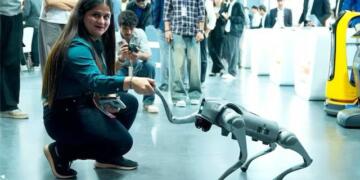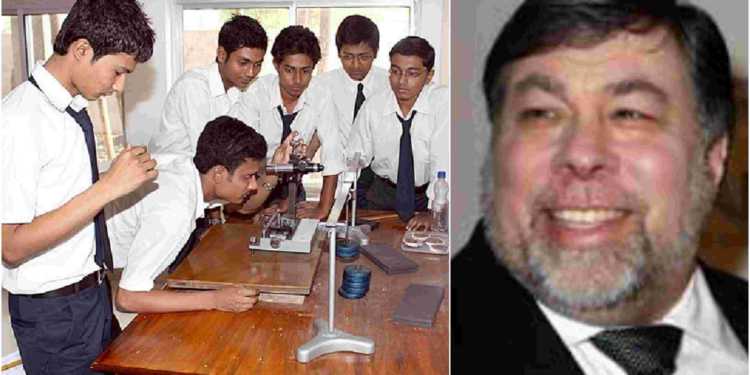Asked about his view on India, with respect to its emergence as a tech super power, Apple cofounder Steve Wozniak said: “I am not an anthropologist and I don’t know the culture of India well enough. I do not see those big advances in tech companies. What is the biggest tech company here, Infosys maybe? I just don’t see that sort of thing coming out of Infosys and I have done keynotes for them three times.” He further added, “The culture here is one of success based upon academic excellence, studying, learning, practising and having a good job and a great life.” He went on to call India a nation that lacks innovation. But guess what Steve, we have already embarked on a mission to become an innovative nation. Innovation is what Atal Tinkering Labs are all about!
German software giant SAP SE on Tuesday signed a Statement of Intent (SOI) with NITI Aayog’s innovation unit- Atal Innovation Mission- under which the company will adopt 100 Atal Tinkering Labs in 2018 for five years, to promote entrepreneurship and innovation in schools across India.
SAP SE issued a statement saying “Collaborating with governments and academia will allow us to ignite innovation in India’s large student population through right guidance, knowledge and infrastructure.” The company will select secondary schools in Delhi, Rajasthan, Gujarat, Maharashtra, Karnataka, Andhra Pradesh and Telangana.
SAP employee-volunteers will coach and mentor students, and the company will also provide CSR (Corporate Social Responsibility) grants through non-profit partners for a holistic learning experience of students.
Atal Tinkering Labs are play workspaces with state-of-the-art technologies like 3D printers, robotics, sensor technology kits, internet of things (IoT), adaptive learning, artificial intelligence and miniaturised electronics to stimulate innovation among secondary school students (classes 6-12). The lab helps students find solutions by exploring and experiencing design and innovation with a do-it-yourself approach. The idea is to cultivate 1 Million children in India as Neoteric Innovators.
Atal tinkering labs are meant to spark creativity amongst children, and help them go beyond regular syllabus and text book learning. This is in keeping with the government’s vision to develop India into a knowledge and technology based superpower, one that is fuelled by ideas and innovation.
NITI Aayog CEO Amitabh Kant said India’s growth for the next few decades will depend on the innovation coming out of these tinkering labs under Atal Innovation Mission (AIM). “Tomorrow’s ideas come from students, who will disrupt industries and creative sectors with new technologies and processes which will thrust India into the leadership position for technological creativity and innovation,” he said.
“This is possible only through effective public-private partnership, and we are delighted to have SAP partner with us on our aim to nurture the future talent of our country”, he further added.
The mission aims to foster innovation, scientific temper and an entrepreneurial spirit in today’s children, who will go on to become successful contributors to nation-building tomorrow. It targets expanding ATL to every district, and establish over 30,000 ATLs over the next three years.
Mission’s Director Ramanathan Ramanan said so far AIM had selected 2,441 schools across the country to establish Atal tinkering labs, out of which 1,100 tinkering labs are already operational. In the last one year, more than 50,000 school students have been engaged in Atal tinkering labs, according to a statement by Niti Aayog.
Till date, 213 schools in Kerala have been selected for Atal tinkering labs, followed by 193 schools in Maharashtra and 186 schools in Uttar Pradesh. Recently, 170 schools have also been identified in Tamil Nadu and 163 in Andhra Pradesh for this purpose.
Facilities including one-time establishment cost amounting to Rs 10 lakhs and operational expenses of Rs 10 lakhs for a maximum period of 5 years would be provided to each of the Atal tinkering labs by Niti Aayog. Parameters such as a minimum area of 1,500 sq ft (1,000 sq ft for schools in hilly area), internet facility and marks scoring percentile of students enrolled in the applicant school, would be considered to sanction the Atal tinkering labs facility through a selection process.
Atal tinkering labs could also host national and state-level science exhibitions to promote inventiveness among school children.
According to Niti Aayog, students who have already got exposure to creative technology platforms to nurture their curiosity, creativity and imagination from ATLs have already started designing prototype solutions and creative projects such as better irrigation management, waste management, and sensor based solutions using IoT devices and robotics.
So there Steve! Watch out.





























